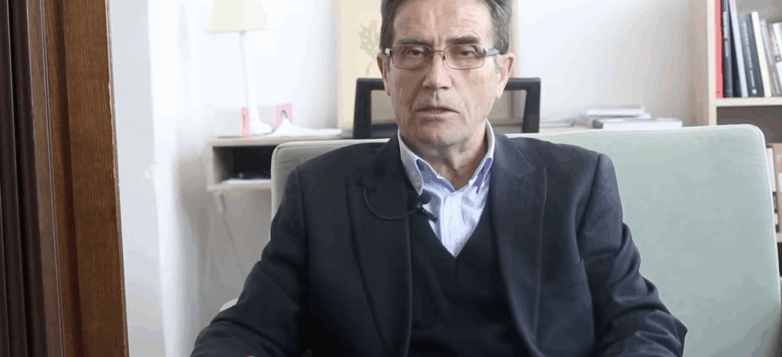Abdyl Gashi (1944), educator, Pristina
Abdyl Gashi: Abdyl Gashi.
Aurela Kadriu: Your activity, what did you work before [you retired]?
Abdyl Gashi: I worked in education almost all the time, all my century of work, except the last six years when I worked for the Ministry of Education.
Aurela Kadriu: Can you tell us whether you remember the summer of 2007? The summer before the declaration of independence…
Abdyl Gashi: I understand. Summer… I remember it in the sense that there was anxiety about what would happen to Kosovo, after the negotiations in Vienna, because of the discussions that were developing there. This is a personal opinion. The Kosovo delegation gave in only when, as the saying goes, they were against the fence or against the wall. To me it was scary because if Ahtisaari’s idea that the Security Council accepted his package didn’t come true, then the Kosovo delegation would be on unequal footing in the negotiation, because they would no longer have room for concessions. The Serbian delegation hadn’t decided the limit of until where,, what. And that was really manifested when the negotiations took place, if you remember, the sentence “Ahtisaari Plus” was famous. And every negotiation that took place later in Brussels and so on…is in fact “Ahtisaari Plus.” So, there was desire, will, happiness for independence, but at the same time, a kind of fear of what would come out of it.
Aurela Kadriu: Do you remember when you first realized or when you first heard that Kosovo would declare independence?
Abdyl Gash: It wasn’t said decisively in public, but when the plan itself was proposed by Ahtisaari and the talks were postponed and… was formed, was added, the mediator was… and it lasted another year, there was hope and the belief that it would happen, it would happen. But how and when, that was still a question. So, the culmination [of this process] was the day of the declaration of independence, which was also a tense situation because we didn’t know whether it was going to happen that day, because it was being postponed all day, until after lunch. The city was seething, the temperature was something like freezing. Then, I guess there was a funeral that day too, I guess Musa Sopi had died and his funeral was that day, I remember we were freezing at the cemetery. I mean, an emotional and happy situation, but also icy cold.
Aurela Kadriu: Where were you on the day of the declaration of independence?
Abdyl Gashi: In Pristina, in Pristina, in Pristina. In the streets of Pristina.
Aurela Kadriu: Can you tell us what you did that day, how did you celebrate? That entire day?
Abdyl Gashi: We were happy, wandering up and down and going inside coffee shops to warm up because it was cold. Meeting, greeting and hugging friends and people. To be honest, looking at the nation celebrating, playing, dancing honored the atmosphere, the setting even more.
Aurela Kadriu: Can you tell us where were you at 15:50 that day, I mean, that is the time when independence was declared, where were you?
Abdyl Gashi: In the square, in the square.
Aurela Kadriu: So…did you see it live?
Abdyl Gashi: No, no. We were watching it on television, but we didn’t stop in front of the television or somewhere to watch it, but during the celebration, the happiness, and the joy that was in the square.
Aurela Kadriu: So, were you watching the parliament session while it was being declared?
Abdyl Gashi: Yes, yes, yes. While it was being read. Also, the comings and goings of Hashim Thaçi, Fatmir Sejdiu and others.
Aurela Kadriu: How would you describe it as a totality, the complete feeling, that entire day? People’s feeling but mainly your personal feelings, what kind of memories did you recall, what did you think about, who did you think about that day?
Abdyl Gashi: I thought of where we used to be and where we had arrived. And of course, a short retrospective of our journey that seems 2,500 years long and not as long as the life of a human being. But maybe it’s because of nature, or what life made us, my generation, that we always look at things with a dose of criticism…and we didn’t like some comings and goings. Let’s call them improvisations, they didn’t leave us with good impressions. The hierarchy must be respected, order must be respected and one should not impose themselves. To me, the ugliest thing about it is that we always try to explain things by putting ourselves at their center, not as part of the process or as participants in the process, but as their pivot. But as I have read from travel writers of earlier centuries, they describe that a characteristic of Albanians is excessive selfishness.
Aurela Kadriu: Do you have anything else to say? Let’s close it here, we only had a few questions. Do you have anything for the end?
Abdyl Gashi: Yes, I have to say that people are pretty disappointed and desperate, not because, I don’t think that this is because this is not a great achievement, but because our expectations for ourselves were greater, to work with more commitment, honesty, conscience and above all, based on rules and laws and not egos and personal fancy.
Aurela Kadriu: Thank you very much, mister Abdyl!
Abdyl Gashi: Please!
